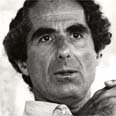
NEW YORK - More than 40 years ago, the event that forever shook the writing career of Pulitzer Prize-winning novelist Philip Roth took place at Yeshiva University.
At that time, Roth, along with Ralph Ellison (author of the 1952 novel, "Invisible Man,") and Pietro di Donato (author of a proletarian novel, "Christ in Concrete,") took part in the March 29, 1962, literary symposium, "A Study in Artistic Conscience: Conflict of Loyalties in Minority Writers of Fiction.” David Fleisher, then chairman of the Yeshiva College Division of Language, Literature and the Fine Arts, served as moderator for the evening.
Philip Roth, then in his late 20s and teaching at University of Iowa, recently had been awarded the 1960 National Book Award for Fiction and the Daroff Award of the Jewish Book Council of America, for his collection of stories, "Goodbye Columbus" (1959).
Roth is among the candidates for the 2004 National Book Critics Circle fiction award, which is set to be awarded Friday. His novel, "The Plot Against America," has one of the most overt Jewish themes of any of his many books.
In awarding him a grant for further writing, the National Institute of Arts and Letters noted that "Goodbye Columbus" marked the coming of age for Roth, "a brilliant, penetrating, and undiscouragable young man of letters."
However, the response from fellow Jews wasn't as cordial, and Roth was criticized from within the Jewish community for his story "Defender of the Faith," (originally published in the April 1959 edition of “The New Yorker” and later included in "Goodbye Columbus"). In this story, Roth illustrated various tensions within the contemporary American Jewish community, and wrote about an immoral Jewish kid serving in the armed forces, who was flawed, aggressive, conniving and interested in money.
'What is being done to silence the man?'
One reader wrote to “The New Yorker”: “Mr. Roth: With your one story…you have done as much harm as all the organized anti-Semitic organizations have done to make people believe that all Jews are cheats, liars, and connivers.”
A prominent New York rabbi complained to the Anti-Defamation League, asking: "What is being done to silence this man? Medieval Jews would have known what to do with him."
Decades later, Roth would recall with anger how he was treated at the Yeshiva University symposium for simply voicing his own minority opinion. At the 1962 symposium, Roth was asked if he would write the same stories had he been living, just decades earlier, in Nazi Germany.
Roth answered "Yes," and that the situation of Jews in America was secure enough that a writer could feel comfortable to write that which he believed to be true.
Trying to shift the focus from the attacks against Roth, Ellison said he had received letters from readers who were furious he depicted incest in a black family, and upon seeing the further assault against Roth, asked the crowd: "What is going on here?"
While the audience quieted down for Ellison, they, afterwards, continued to attack Roth for his comments.
'Most bruising public exchange'
When the program ended, and Roth tried to leave the stage, those students who were most antagonistic towards Roth during the lecture gathered around him and began to yell at him. As Roth recalled the Yeshiva events in his 1988 autobiography, "The Facts:" "I listened to the final verdict against me, as harsh a judgment as I ever hope to hear in this or any other world. I only began to shout, 'Clear away, step back - I'm getting out of here,' after somebody, shaking a fist in my face began to holler, 'You were brought up on anti-Semitic literature!' 'Yes,' I hollered back, 'and what is that?' - curiously wanting to know what he meant. 'English literature!' he cried. 'English Literature is anti-Semitic literature.'"
Later that night, at dinner with his wife and his editor at the Stage Delicatessen, Roth vowed he would "never write about Jews again." However, Roth continued writing about Jews, albeit from a different perspective. As he later recalled, "I had misunderstood the implications of the event for me, actually, because the fact of the matter was that rather than never writing about Jews again... I was actually branded... It was probably the luckiest thing that ever happened to me to run into such a fierce opposition so, so quickly in a career. And it fixed the subject for me, it fixed my focus, it fixed my attention."
The encounter at Yeshiva was, according to Roth, "the most bruising public exchange of my life," and it turned out to be the beginning of his taking issue of his own personal Jewish identity and allegiance towards his faith. "After an experience like mine at Yeshiva, a writer would have had to be no writer at all to go looking elsewhere for something to write about," Roth later recalled.
Roth took from his experience that the audience comprising Yeshiva students and faculty was "fanatically insecure."
YU English literature professor Maurice Wohlgelernter contested that claim in a 1989 review of "The Facts." Wohlgelernter wrote that "anyone who has undergone the Yeshiva University experience can attest that ‘fanaticism’ is not central to it. As in any other American university, the students and faculty read, study, explicate texts in English, American, Irish and French literature with as much intensity and objectivity as they do in Biblical and Talmudic ones. A casual visit to any classroom would quickly convince him of that. And few, if any, of the students of those texts, he would learn, suffer from ‘fanatical insecurity.’ If anything, steady admission to the very best Ivy League graduate schools may have made them a bit too secure; at times, fanatically so. And that, from personal experience, is fact. Roth, one fears, misinterprets the facts there."
Reprinted with permission from The Commentator , the student-run newspaper of Yeshiva University















